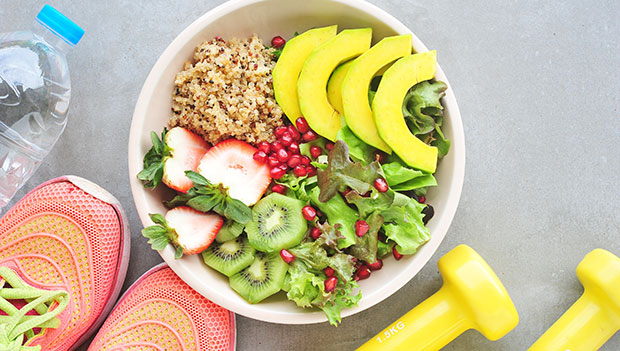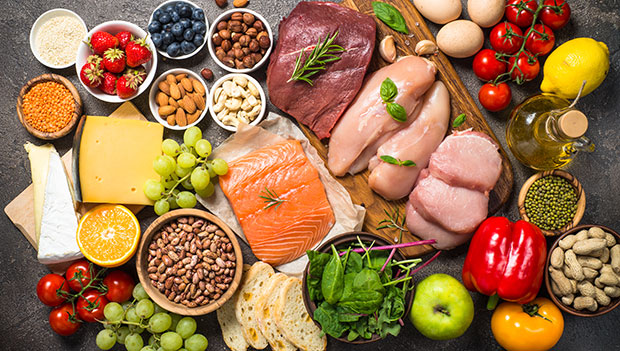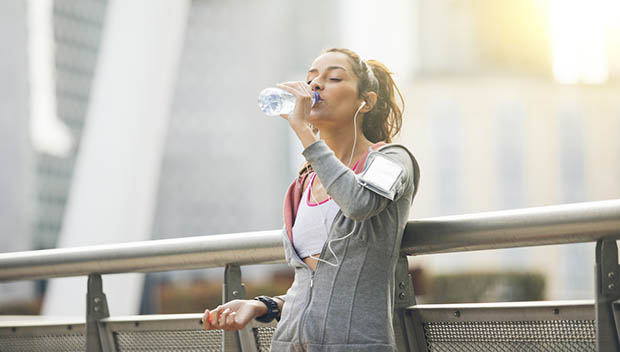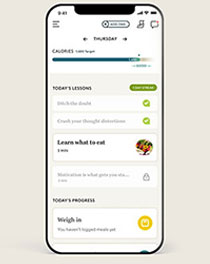
By clicking on the product links in this article, we may receive a commission fee at no cost to you, the reader. Sponsorships and affiliate commissions help support our research so we can help you find the best products. Read the full affiliate disclosure here.
Rice Krispies before a workout? Maybe chocolate milk? Or is that after a workout? There's so much information swirling around about what to eat before a workout, that it's easy to get overwhelmed by it all.
We do know that providing your body with the adequate hydration and nutrition at the right time can maximize your performance abilities, improve endurance, and assist with muscle repair and restoration.
Why not make the most of your workout by giving your body the best chance to optimize its effectiveness? Keep reading for a comprehensive yet simplified look at what you should eat before a workout.
Learn lasting healthy eating habits with NOOM:
Macronutrients
The three main macronutrients we're concerned with are carbohydrates (carbs), protein, and fats. Eaten in varying ratios based on your specific needs, they each play an important role in what to eat before a workout. Let's take a closer look at each.
Carbohydrates
Carbs are the main source of energy that our bodies use. When we eat them, they are converted into blood glucose and shuttled into our cells to provide energy. Excess blood glucose is converted to glycogen which is stored in our muscles and liver and is also used for energy, particularly during exercise and strenuous activity.
Given this information, you can imagine how important eating carbohydrates is before working out. The quantities you should eat varies based on your size as well as the type of activity you plan to do.
For high-intensity and endurance exercises such as a spin class or training for a half marathon, it's important to make sure your glycogen stores are high so that you are able to exert the required amount of energy for the specific exercise. If you are planning on exerting less energy, say doing a restorative yoga class, then your glycogen stores don't need to be nearly as high. Regardless, it is still important to maintain a fed state. That means eating mostly balanced meals regularly and consistently every day.
Prior to a high-intensity or endurance workout, have a meal high in carbohydrates three to four hours before you begin training and an additional carb-rich snack 45-60 minutes before training, as well. This will ensure that your blood glucose and glycogen stores are in a good place for optimal performance.
For less strenuous activity, eating a balanced meal a few hours before your exercise might be just enough to get you through without it negatively impacting your performance.
Protein
Protein is vitally important to a nutrition program regardless of your exercise preference. Protein's primary job is to provide the components necessary for muscle repair and growth post-exercise.
Traditionally, it was thought best to consume a larger dose of protein within the first hour or two after a workout. However, new research supports the benefits of including protein in a pre-workout snack or drink. In fact, the International Society of Sports Nutrition (ISSN) holds the position that whether to have protein before or after a workout should be left up to the individual's tolerance.
Regardless, if carbohydrates are the primary source of energy and should be prioritized prior to a workout, the addition of protein to those meals and snacks is a bonus.

Fats
The most calorie-dense macronutrient, fat, is an important source of energy. However, it is likely not the best thing to eat before workout.
Fats are slow to digest which means that the energy derived from them is delayed in getting released. Slow digestion also means that fat lingers in the stomach longer. This can cause stomach upset during exercise, which is not only uncomfortable but could also impair exercise performance.
It is important to include healthy fat in a well-balanced diet, and it could certainly be added to a pre-workout meal when there's plenty of time to digest, but is typically best to save for after your workout.
Supplements That Can Be Helpful
Many people benefit from taking supplements in the form of a pre-workout drink or nutrition bar. Take a look at some helpful supplements below:
- Branched-chain amino acids (BCAAs). Taken before a workout, BCAAs have been shown to increase time to muscle exhaustion, improve muscle repair, and decrease soreness.
- Beta-alanine. Beta-alanine is thought to improve high-intensity exercise, especially by increasing time to exhaustion.
- Creatine. Research demonstrates that creatine is one of the best pre-workout supplements. In many studies it has consistently improved overall power. More research has shown additional health benefits from taking creatine supplements, as well.
- Caffeine. When taken prior to exercise, caffeine has been shown to support considerable improvements in power and overall performance.
Additionally, there are pre-workout drinks that have a mixture of many of these supplements and more. These are called multi-ingredient pre-workout supplements and have been shown to provide significant benefit in improving time to exhaustion and general performance.
Timing Your Pre-Workout Meal
How long should you wait to work out after eating? It can depend on a few things. For example, what is best to eat before a morning workout? If you've come from an overnight fast and would like to have breakfast before you work out, having a small, light breakfast one to two hours prior to working out will do.
If you're wondering how long after eating to work out when you've just had a large meal, it's a good idea to wait three to four hours to give the food time to digest. Working out on a full stomach can impede performance as well as cause discomfort.
So, how long after eating can you work out if you've just had a small meal? It's usually recommended to have a pre-workout drink or a pre-workout snack within the hour of working out. Therefore anywhere from 45-60 minutes before working out is probably best for optimal benefits.
Hydration
It's not surprising that hydration is one of the most important aspects of healthy exercise. Proper hydration can not only help to keep blood flowing as it's supposed to, but it can ensure your performance is as good as it can be.
So when you're thinking of what to drink before a workout, start with water long before your pre-workout drink.
Ever hear of people eating salt before a workout? It's actually not as preposterous as you might think, as salt in the form of sodium is lost in sweat. Sodium is also one of the main ingredients in sports drinks. Because we lose sodium in sweat, it is important to stay ahead of it before the delicate fluid balance in our body is affected. This is especially true for hot environments.

The National Athletic Trainers Association recommends having 500-600 milliliters of water or sports drink two to three hours before an event, and 200-300 milliliters water or sports drink again 10-20 minutes before exercise.
Examples of Pre-Workout Snacks and Meals
Take a look at these meal ideas for a few hours before a workout. We are aiming for options heavy in complex carbs:
- Apple cinnamon oatmeal with walnuts
- Egg and turkey sausage on a whole-wheat English muffin with a side of melon
- Beef and broccoli over brown rice
- Shrimp and veggie bowl with quinoa
- Chicken cacciatore with bell peppers and whole-wheat pasta
Here are some pre-workout snacks to try 45-60 minutes before working out:
- Slice of whole-grain toast with almond butter and banana
- Apple and peanut butter
- Greek yogurt with low-sugar granola
- Whole-grain cereal with preferred milk
- Dried fruit and nuts
- Low-sugar granola bars
Foods to Avoid
With all this discussion about what to eat before a workout, there are some foods that we want to steer clear of, including:
- Spicy foods. This is kind of an obvious one. Spicy foods have the tendency to cause heartburn and GI discomfort—two things that you certainly do not want while you are putting your all into exercising.
- Raw cruciferous vegetables. Vegetables such as broccoli, cabbage, cauliflower, and Brussels sprouts have the tendency to cause excess gas and bloating which can create serious discomfort during a workout.
- High-fat and fried foods. As mentioned above, foods very high in fat are slow to digest which can leave you feeling weighed down and sluggish during those moments you intend to have the most energy.
- Carbonated beverages. Even drinks that don't have sugar added to them but are carbonated cause the stomach to expand with excess gas. This can lead to bloating, cramping, and flatulence.
What About Post-Workout Nutrition?
You might not feel hungry for a full meal right after your workout, but it’s still important to include a higher-protein food within two hours of exercise. You can have a post-workout snack or you can certainly have one of the meals listed below, however, the emphasis is now placed on protein instead of carbohydrates.
Ever had chocolate milk after a workout? Believe it or not, it’s not a bad option for a quick grab-and-go snack. The chocolate sweetness offers quick carbs and the milk is a nice combination of carbs and protein. It’s a solid option if you’re in a pinch.
Here are snack options to have after your next workout:
- Greek yogurt and fruit or low-sugar granola
- Whole-wheat toast with almond butter
- Shredded wheat cereal with milk
- Cottage cheese with mandarin oranges or pineapple
- Prosciutto and melon
- Rolled turkey with cheese and grapes
- Cheese and whole-grain crackers
- Tuna salad on whole-grain crackers
- Rice cakes with peanut butter
Or, if you’re hungry enough for a meal:
- Grilled chicken breast with asparagus and brown rice
- Egg, veggie, and potato frittata
- Tuna salad sandwich
- Soft tacos with lean ground beef and veggies on whole-wheat tortillas
- Shrimp and quinoa summer cold salad
- Oatmeal with fruit and nuts
- Turkey burger on a whole-wheat bun with a side salad
Final Takeaway
You should now have a general idea of what to eat before a workout. There is a significant amount to consider, such as the ratio of carbs, protein, and fat that you choose to put on your plate.
Carbohydrates are the primary food for eating before a workout since they are the body's preferred energy source. Protein is still very important for muscle synthesis and repair. Healthy fat should be included in most aspects of a healthy diet. However, foods high in fat as well as spicy foods, cruciferous vegetables, fried foods, and carbonated drinks should be avoided right before a workout.
It may also be a good idea to add a pre-workout supplement in the form of a drink or nutrition bar, as they can be very beneficial to workout performance, power, and repair. Whether you choose to have a pre-workout drink or not, it's important to drink plenty of water or a sports drink prior to and during exercise.
The timing of your pre-workout meal or snack also plays an important role in overall performance. If you eat a big meal too close to exercise, your performance is likely to suffer. If you don't eat enough before working out, again, your performance will probably disappoint.
With these tips and some solid determination, your next workout is bound to be your best!
Disclaimer: I am not a medical doctor. This article is for informational purposes only. It is not a substitute for professional medical advice. Always seek professional medical advice before making changes to your exercise habits.
What to Eat Before a Workout | Creatine Timing | Protein Timing | Best Pre-workout Supplements | Best Post-Workout Supplements | Best Creatine Supplements | Best Protein Powder Supplements | Best Peanut Butter | Best Greek Yogurt



